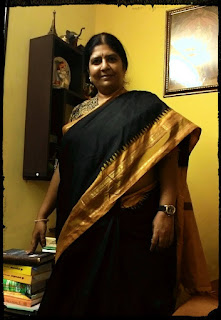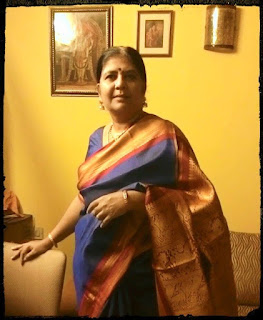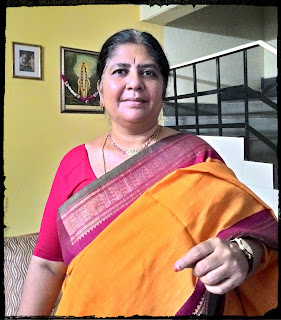‘Karupputhaan enakkup pudicha kalaru…..sami karupputhaan sami silayum karupputhaan’. Yes, what a day to post a black, the day we celebrate ‘Saavle Sundar Roop Manohara’ Vittala the most, Ashadh Ekadashi. I have been for couple of years now attending the Bolava Vittala, concert of Abhangs on the day. The Kaikolar Senguntar community long had a history of being main bearers of Kanchi Perarulalan on his processions and his visit till date on Garuda Sevai to Pillayar Palayam where the community lived largely testifies to that connection. The deeper temple connection is of course etched in Kachi silks over centuries – the temple borders, the rudrakshapets, hamsam, mango motifs. Perhaps the Vijayagara/Nayaka sculptures and the Silk saree designs of Kanchi match very well. Maybe some art historian has recorded all these…have to look for them.
Coming to the story of this black silk – black per se is not a banned colour generally among Iyengars, we wear them on all occasions except for a few who consider it inauspicious or not lucky astrologically. But, buying a black silk is once in a life time affair, for it is Masakkai Karuppu, a black silk saree given to the daughter during first pregnancy. Whenever I bought a black saree (it used to be my favourite for long), which my father always asked me to avoid, mother would take it and hide….finally I was happy a day had come when she herself would buy me a black silk. In our family the black silk doesn’t come during pregnancy but after the child is born and one is ready to go back to husband’s house from mother’s after delivery. So, obvious this is a saree #100Sareepact I got from my mother after my daughter was born. Matched it with a new Kalamkari blouse from iTokri after having attempted a mustard Mangalgiri, a red, black, zari combination in jacquard. This post is open to corrections, suggestions as history, references, practices might vary and I may not have captured it perfectly.
Coming to the story of this black silk – black per se is not a banned colour generally among Iyengars, we wear them on all occasions except for a few who consider it inauspicious or not lucky astrologically. But, buying a black silk is once in a life time affair, for it is Masakkai Karuppu, a black silk saree given to the daughter during first pregnancy. Whenever I bought a black saree (it used to be my favourite for long), which my father always asked me to avoid, mother would take it and hide….finally I was happy a day had come when she herself would buy me a black silk. In our family the black silk doesn’t come during pregnancy but after the child is born and one is ready to go back to husband’s house from mother’s after delivery. So, obvious this is a saree #100Sareepact I got from my mother after my daughter was born. Matched it with a new Kalamkari blouse from iTokri after having attempted a mustard Mangalgiri, a red, black, zari combination in jacquard. This post is open to corrections, suggestions as history, references, practices might vary and I may not have captured it perfectly.




Comments
Post a Comment